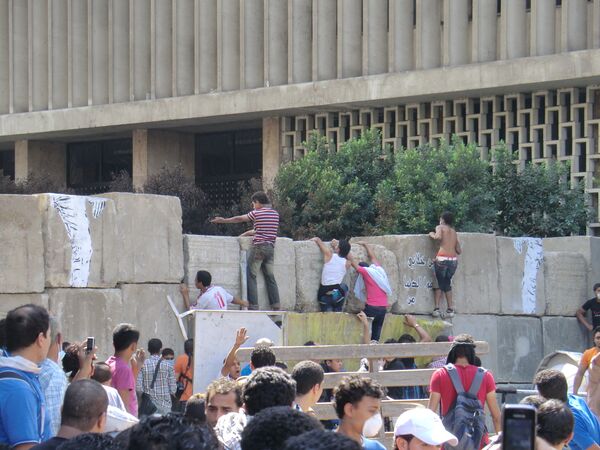Smoke billowed from behind a concrete barrier erected last Friday to prevent protesters from storming the U.S. Embassy building in Cairo. Volleys of tear gas were being fired by security forces to disperse a crowd of around 200 youths hurling rocks over the concrete slabs.
I arrived at the scene just as another tear gas canister was being fired at the protesters, triggering a stampede. The rock-throwers, some wearing gas masks, ran past the nearby Omar Makram Mosque heading towards Tahrir Square, already thronged by several thousand peaceful protesters. They had gathered to express their anger at a U.S.-made film they deemed insulting to Islam's revered Prophet Mohamed.
The protests were held despite the cancellation of a "million people rally" called earlier last week by the ruling Muslim Brotherhood movement. Concerns that the rally would turn violent had prompted the moderate Islamist group to backtrack on its plan.
The majority of the protesters in Tahrir Square were Salafists, sporting the trademark bushy beard or the niqab (face veil) worn by members of the ultra-conservative sect.
"We've come to defend Prophet Mohamed," said protester Abdul Rahman Mohamed , an imam at a mosque in the Cairo suburb of Helwan. "We demand that the creators of the film be punished. If they are Egyptians as we're being told, they should be stripped of their nationality."
Mohamed insisted however that the protests must be peaceful.
"We do not condone violence of any kind," he said, dismally shaking his head at the sight of the young demonstrators pelting security forces with rocks. "The security men are just doing their job guarding the embassy. They are Egyptians too. It's wrong to attack them.”
Waving his hand, he beckoned the agitators to stop their onslaught.
The scene on Friday, the fourth consecutive day of anti-U.S. protests in Egypt over the film "Innocence of Muslims" was reminiscent of anti-military protests in February 2012 and November and December 2011 when street children were at the frontline of the protest. Battling the security forces was a means for them to vent their anger at poverty, deprivation and police brutality. In Friday's protest too, many agitators were adolescents, some as young as 13 or 14.
Supporters of the national football team El Ahly - popularly known as the "ultras" - who also played a role in anti-military protests in the transitional period - were again among the rioters in the Friday protest. They were seen ripping up paving stones to hurl at security forces on the other side of the barricade.
Many of them are outraged that the perpetrators of last year's deadly stadium riot in Port Said have not been brought to justice. The "anti-U.S. protests" could be an opportunity for them to get even with their enemies in the police force for what they say was its failure to prevent the deaths of 74 football fans in the tragic stadium massacre.
Among the demands of the protesters near the U.S. embassy was the expulsion of the U.S. Ambassador to Egypt and legal action against the creators of the film.
Egypt's new Islamist President Mohamed Morsi vehemently condemned the film. Careful not to upset the Salafists, his denunciation of the Islamists' violent response to the film came two days later. His silence offended the U.S. administration, with President Barrack Obama saying in an interview that Egypt was "neither an enemy nor a U.S. ally."
"President Morsi must take a firm stand against the U.S. How can he remain silent when the Prophet Mohamed has been insulted?" cried Safaa Abdel Karim, a veiled protester.
Morsi is in a tight corner: he can either choose to crackdown on the protests at home and risk losing the already fragile support of his people or he could appease the Egyptian public and lose favor with the United States.
Waving his shoe in the air, another angry protester cried: "We can do without U.S. aid if the price for that is our dignity and disrespect for our Prophet."
Other protesters chanted in unison after him, "No to insulting our Prophet!"
Many of the demonstrators carried black flags depicting the Islamic text "There Is No God But Allah."
The trailer of the film "Innocence of Muslims" that triggered the outpouring of anti-American sentiment across the Muslim World, has been pulled from the Youtube website. Islam forbids the impersonation of all prophets. The Prophet Mohamed was portrayed in the trailer as a sexual pervert.
Mina Morcos, a Christian Coptic protester who had come to Tahrir Square to show solidarity with Muslim fellow citizens stepped forward brandishing a cross.
"All previous attempts to foment sedition have failed," he said, citing the recent sectarian unrest in Dahshour as an example. "Christians and Muslims are one in this country. We won't allow anyone to divide us."
The anti-Islam film was reportedly produced by three Egyptan Christians - Joseph Abdelmasih, Nakoula Basseley and Morris Sadek - residing in the U.S. Sadek is also being accused of promoting the film on the website of a Coptic Christian group headed by him.
Diaspora Copts have traditionally been far more outspoken about the discrimination faced by Egypt's minority Copts (who make up 12 to 15 percent of the population) than Copts living in Egypt. U.S. support for the estimated 300,000 Diaspora Copts has often been a bone of contention in Egyptian-U.S. relations with Egypt regarding it as "unwelcome interference in the country's internal affairs."
An Egyptian protester was reported killed Friday in clashes with security forces, the first Egyptian victim of the anti-U.S. riot in the country. The U.S. has issued stern warnings to Arab leaders to contain the violence.
Shahira Amin is an Egyptian journalist, the former deputy head of Egyptian state-owned Nile TV and one of its senior anchors.

